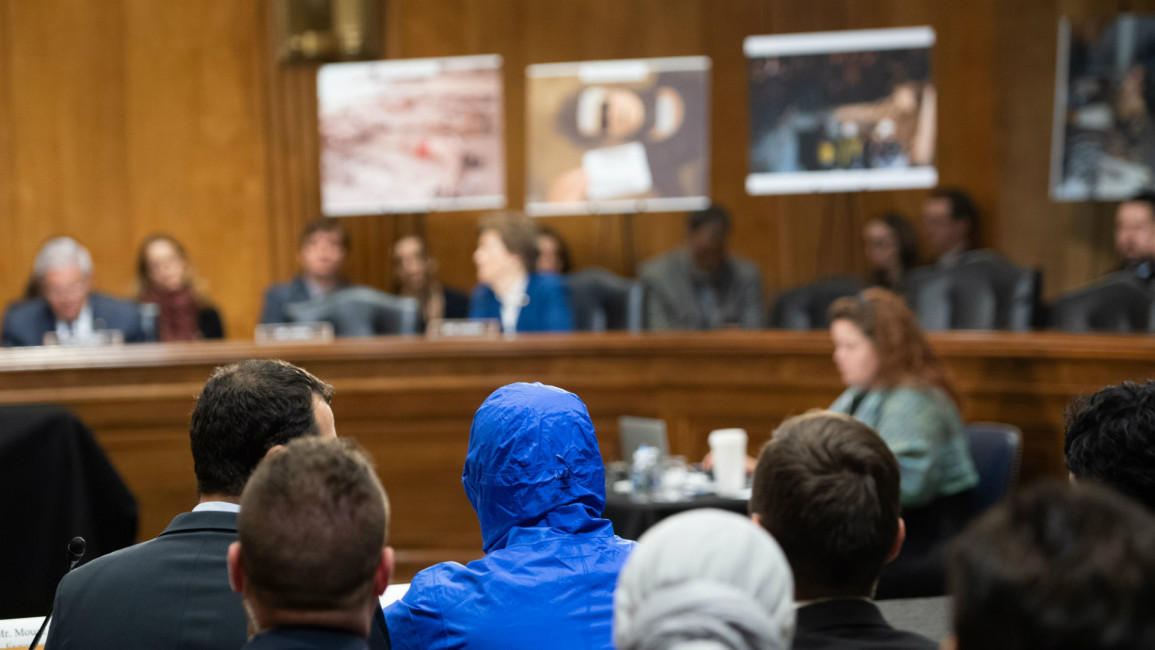Syrian military defector, Caesar, tells US Senate about regime's torture dungeons
Syrian military defector, Caesar, tells US Senate about regime's torture dungeons
Days before the Syrian war enters its tenth year, Syrian activists laid out the ongoing brutal torture conducted by regime forces.
3 min read
A Syrian military defector who goes by "Caesar" testifies before the US Senate [Getty]
A Syrian military defector detailed the humanitarian disaster of Syria's civil war before the US Senate's Foreign Relations Committee on Wednesday, as the conflict approaches its tenth consecutive year.
The defector, who goes by the pseudonym "Caesar" and wore a blue hood while testifying behind closed doors in Washington, DC, was once a forensic photographer in Syria's military police.
After photographing thousands of bodies held in two military prisons in Damascus, Caesar secretly duplicated the photos and sent copies out of Syria through members of the opposition in 2013. Caesar was eventually smuggled out of the country when his safety was at risk.
"My daily work was mixed with pain and sorrow due to the painful scenes that I saw every day on the bodies of the victims including men, women, and children," Caesar said Wednesday. "The signs of torture were clear on their brittle bodies including burning, strangulation, and whipping with cables."
Since his exit from Syria, Caesar has advocated for the United States to pass the Caesar Syria Civilian Protection Act, legislation which imposes sanctions on entities that conduct business with Syrian President Bashar Al-Assad government.
The bill passed last year, but did little to curb the bloodshed in Syria.
"Killing has increased in the same places and in the same ways and at the hands of the very same criminals," Caesar testified. "And the reason simply is that the Assad regime considered the inaction of the international community and the mere statements of condemnation as a green light for him to continue his crimes against the Syrian people [...]."
Read more: Syria Weekly: Caesar Act to become law, with tough sanctions on Assad's torture enablers
Also present at the hearing were Raed Al-Saleh, head of the Syria Civil Defence - also known as the White Helmets - and Omar Alshogre, a representative of the Syrian Emergency Task Force.
"I do not wish to sit here in 2025 detailing the suffering of yet another unprecedented humanitarian catastrophe in Syria," said Saleh. "As we enter the tenth year of war, the world has run out of words. Now is the time for action."
Alshogre, a Syrian war survivor, recalled his arrests and brutal torture by regime forces throughout his teenage years in Syria.
After witnessing his cousins' deaths at the hands of prison guards, Alshogre narrowly escaped with his life when his mother bribed officials to smuggle him out of jail when he was supposed to be executed.
According to media reports, the testimonies left US senators nearly speechless.
The Idlib province, Syria's last opposition bastion targeted by Assad's aggressive military campaign, may see a ceasefire between Turkey and Russia, two main players in the conflict.
Civilians continue to bear the brunt of the conflict, facing death amid heavy bombardment or forced to endure freezing temperatures in the exposed, makeshift camps.
The defector, who goes by the pseudonym "Caesar" and wore a blue hood while testifying behind closed doors in Washington, DC, was once a forensic photographer in Syria's military police.
After photographing thousands of bodies held in two military prisons in Damascus, Caesar secretly duplicated the photos and sent copies out of Syria through members of the opposition in 2013. Caesar was eventually smuggled out of the country when his safety was at risk.
"My daily work was mixed with pain and sorrow due to the painful scenes that I saw every day on the bodies of the victims including men, women, and children," Caesar said Wednesday. "The signs of torture were clear on their brittle bodies including burning, strangulation, and whipping with cables."
Since his exit from Syria, Caesar has advocated for the United States to pass the Caesar Syria Civilian Protection Act, legislation which imposes sanctions on entities that conduct business with Syrian President Bashar Al-Assad government.
The bill passed last year, but did little to curb the bloodshed in Syria.
"Killing has increased in the same places and in the same ways and at the hands of the very same criminals," Caesar testified. "And the reason simply is that the Assad regime considered the inaction of the international community and the mere statements of condemnation as a green light for him to continue his crimes against the Syrian people [...]."
Read more: Syria Weekly: Caesar Act to become law, with tough sanctions on Assad's torture enablers
Also present at the hearing were Raed Al-Saleh, head of the Syria Civil Defence - also known as the White Helmets - and Omar Alshogre, a representative of the Syrian Emergency Task Force.
"I do not wish to sit here in 2025 detailing the suffering of yet another unprecedented humanitarian catastrophe in Syria," said Saleh. "As we enter the tenth year of war, the world has run out of words. Now is the time for action."
|
|
Alshogre, a Syrian war survivor, recalled his arrests and brutal torture by regime forces throughout his teenage years in Syria.
After witnessing his cousins' deaths at the hands of prison guards, Alshogre narrowly escaped with his life when his mother bribed officials to smuggle him out of jail when he was supposed to be executed.
According to media reports, the testimonies left US senators nearly speechless.
The Idlib province, Syria's last opposition bastion targeted by Assad's aggressive military campaign, may see a ceasefire between Turkey and Russia, two main players in the conflict.
Civilians continue to bear the brunt of the conflict, facing death amid heavy bombardment or forced to endure freezing temperatures in the exposed, makeshift camps.



